A rabbit owner is so used to seeing their rabbit chewing almost every time. Whatever these precious little creatures see, they would probably chew it. Rabbit chewing is already part of their nature, and sometimes, it can also indicate if something is wrong with your pet. After all, what is the essence of having long and huge teeth, right?
What is rabbit chewing?
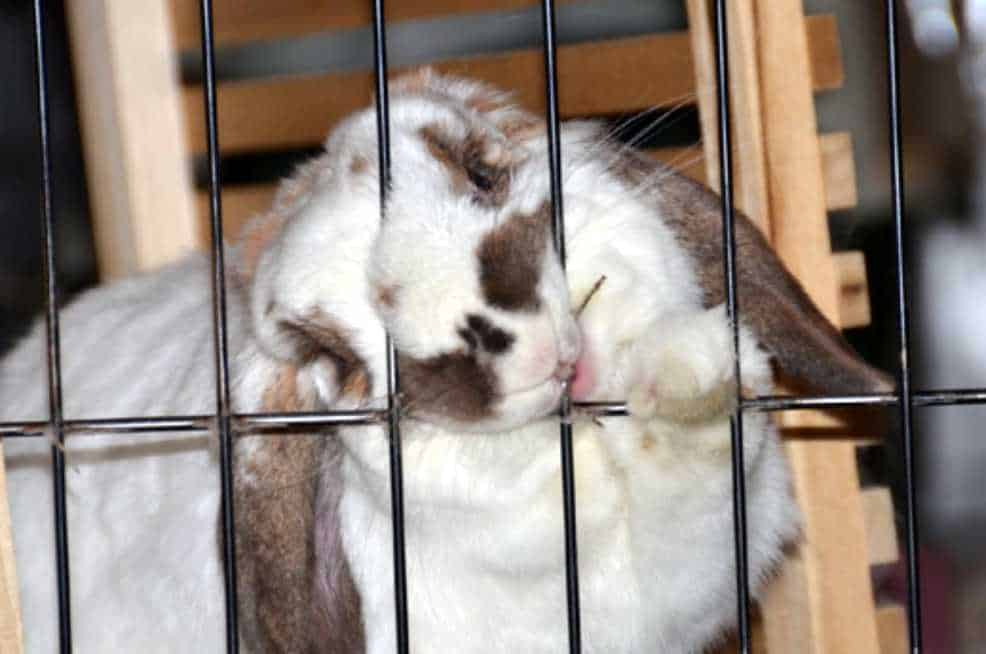
You may often see your rabbit chewing, which sometimes may feel like it is the only thing they are doing. Do not worry, though, because it is a natural habit for rabbits. They tend to chew their food most of the time longer than usual.
However, sometimes, you may overlook the signs that their habit of chewing is quite alarming already, which can be caused by their dental health concerns. The reason why rabbits need to chew regularly is that they are all born with open-rooted teeth. Thus, their teeth are constantly growing. Rabbit chewing is necessary to avoid overgrowing of their teeth.
Rabbit Teeth
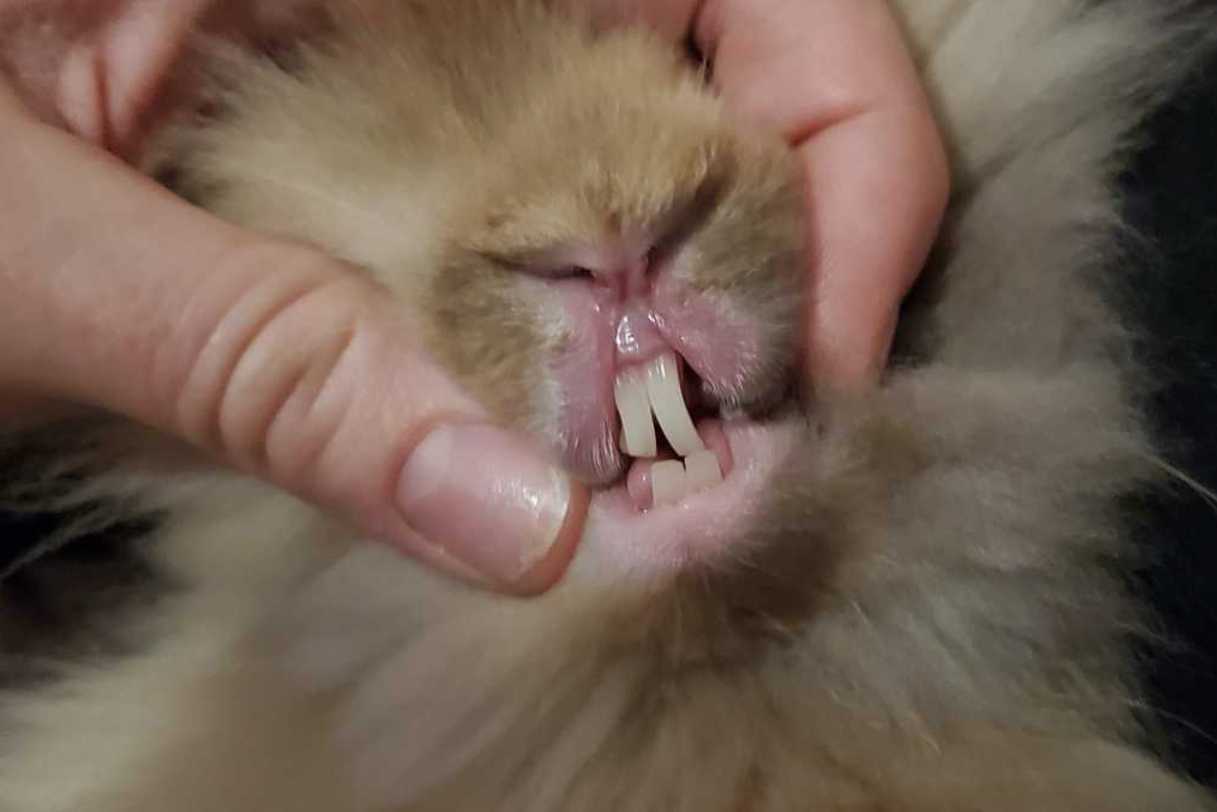
Before we learn more about the rabbit chewing habit, let us know a few things about their teeth first. It is essential that you fully understand how the teeth of your pet rabbit work will eventually help you prevent some unwanted teeth conditions or extreme chewing habits.
Nevertheless, do not forget that rabbit chewing is still part of their nature to slow down or prevent the overgrowing of their incisors. Intervention is only needed when the rabbit chewing situation gets worst.
Understanding the oral anatomy will enlighten us on why these rabbits need to chew constantly. With this, a rabbit’s whole set of teeth has 28 permanently and endlessly growing teeth. This means these teeth grow their entire life unceasingly, and this tooth type is called Elodont tooth, which simply means an ever-growing tooth due to lack of true roots.
Rabbits have a total of 6 incisors, having 4 incisors at the upper set of teeth – two in front, which people usually see, and another two behind it. Then the lower set of teeth also has two incisors that rub against the peg teeth, especially when the mouth of the rabbit is closed.
Rabbits do not have canine teeth compared to other household pets. Instead, they have a diastema, the gap between the premolar teeth and the incisor teeth.
In addition to this, the term called for both the molars and the premolars of the rabbit is cheek teeth. Cheek teeth have two parts: the maxillary or the upper cheek teeth and the mandibular or the lower cheek teeth. Please note that these cheek teeth continue to grow despite their curve growth direction.
Hence, we can now understand the struggle of these tiny, precious, and adorable creatures.
Learn how to check your rabbit’s teeth by watching this tutorial.
Is it normal for rabbits to chew?
Do not worry if you often see your rabbit chew. Constant chewing of rabbits is normal unless you notice something weird or unusual. Rabbits need to constantly chew (not exaggerating at all) their entire life because their set of teeth continuously grows, and sometimes, rabbits cannot even catch up with the growth rate.
When rabbits cannot wear down these teeth, it can lead to a sharp one that can eventually hurt the insides of their mouth and cheeks, which can be very painful. Chewing enables the rabbit to unsharpen, grind its teeth, maintain its size, and avoid overgrowth.
Things that are safe and not safe for rabbits to chew
The goal of rabbit chewing is to prevent their teeth from overgrowing. However, we also agree that they unknowingly chew some things that are not safe for them. We always emphasize the importance of being a responsible owner to keep away your pet rabbit from something they are not supposed to chew.
4 Things that are safe for my rabbits to chew
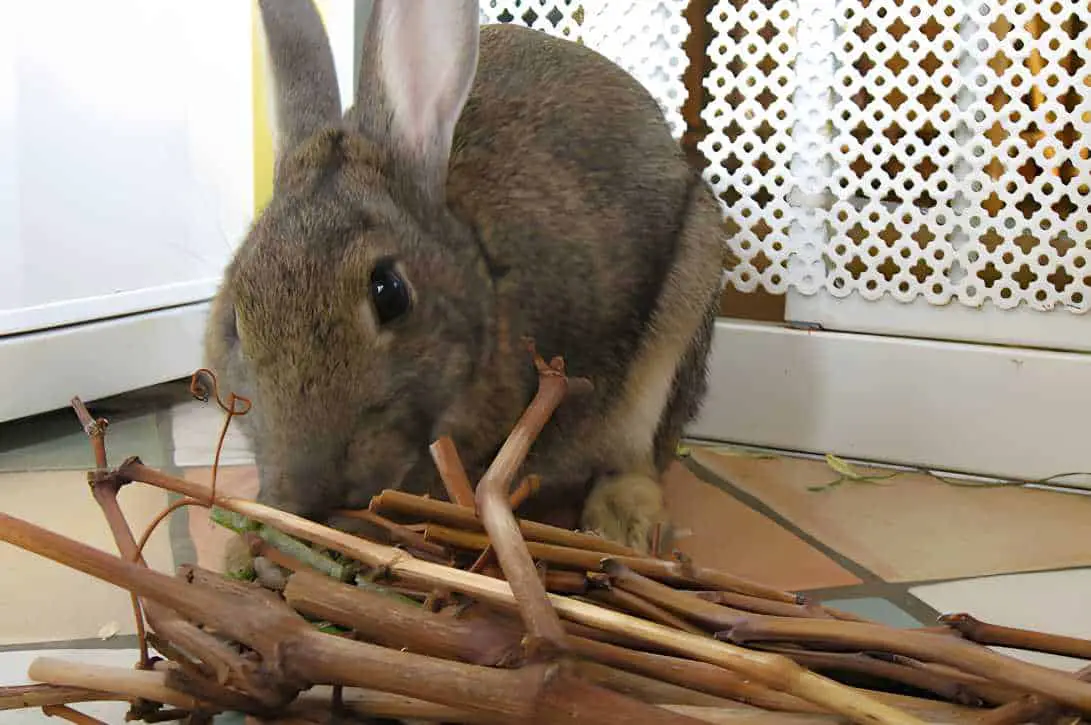
Apart from their food, there are things that you can comfortably let your furbaby chew from time to time. Letting theme chew these things will not give you a heart attack or will not let you overthink if they might have hurt themselves or they are in extreme pain.
Listed below is the list of the things you can let your pet rabbit chew:
- Cotton towel – you can let your rabbit chew their own small cotton towel as long as there are no fibers they might accidentally ingest.
- Different kinds of hay – you can let your rabbit chew on different types of hay. You can either choose from them or give them a variety from time to time. The most recommended kind of hay to introduce to your rabbit is the Alfalfaas it has a high content of calcium, but too much ingestion can cause a health concerns. Therefore, changing from one variety to another is highly suggested.
- Twigs and branches– rabbits like to chew on their favorite twigs and branches, all of which have different tastes. Thus, you have comprehensive options. Some of the woods that your rabbits can chew are Maple, Cottonwood, Willow, and a Kiln-dried Aspen, to name a few.
- Vegetables (primarily greens) – different green vegetables that are fresh and uncut can be given to your rabbits. Please note that the thicker and the harder the vegetable is, the better, as rabbits will take much time to chew and grind their teeth. Highly recommended vegetables are lettuce, cilantro, dandelion, carrots, and parsley, to name a few.
3 Things that are not safe for my rabbits to chew
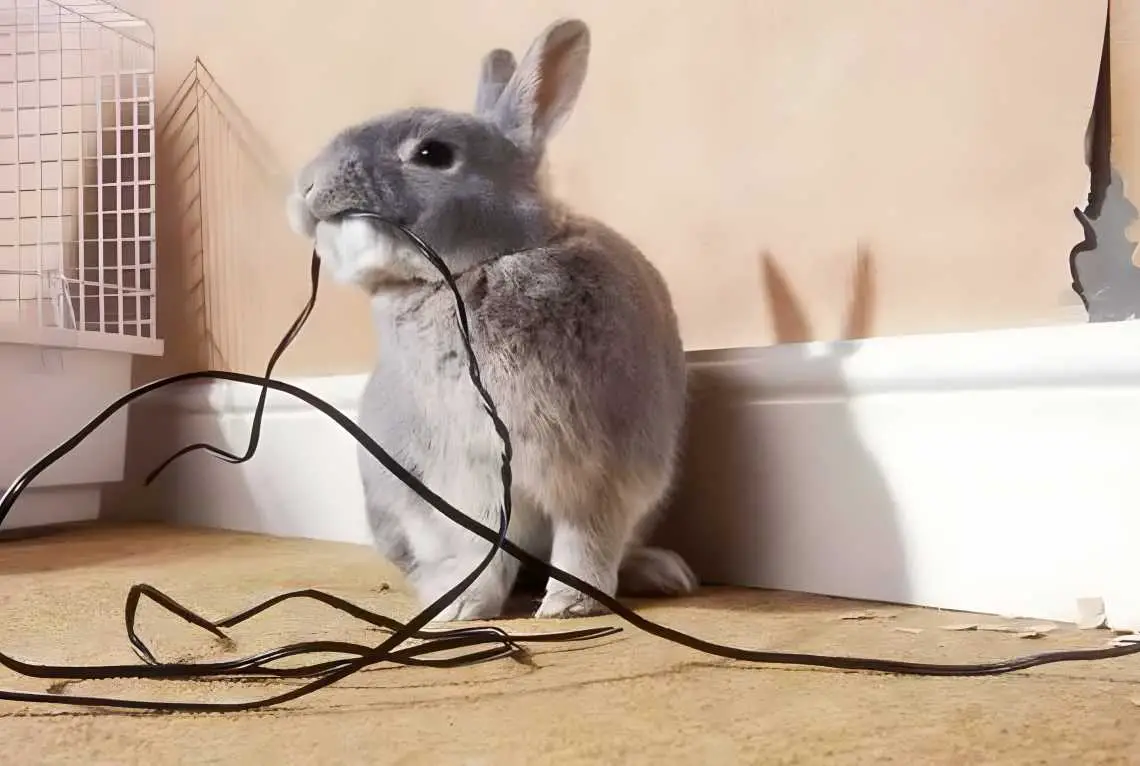
If there are things that your rabbit can chew on, there are also banned materials that your rabbits should never chew. Check the list below to find out what are those:
- Plastics – plastics are considered to be one of the artificial materials that were invented. However, plastic can be very toxic, and once ingested by your pet rabbit; it can cause some health concerns to your rabbit. Remember that it takes years for plastic to decompose fully. Therefore, the rabbits, too, cannot digest plastic once ingested.
- Electrical wires – electrical wires are a hazard not only for humans but for animals too. Make sure that you keep your rabbits away from any electrical wires because they are very fond of them, as these cable wires look similar to roots in the eyes of a rabbit. Thus, they cannot resist the temptation once they see one. It can be fatal when a rabbit chews on an electric cable.
- Houseplants or Indoor plants – rabbits cannot differentiate between plants they see. It is already part of their instinct that once they see a plant, they have to chew it. However, most indoor plants are poisonous and can be a threat to the safety of your pet rabbit.
2 Other Reasons why rabbits keep on chewing
We have already mentioned that the continuous growth of your rabbit teeth is the primary reason they have to chew constantly. However, apart from this, there are also other reasons why they do it:
Sex or Gender
A doe or a female rabbit chews a little more often compared to its counterpart.
Hormones
Sometimes, hormones, too, play a big part in why there are rabbits that chew more than they should, regardless of their gender. To reduce its chewing frequency, it is necessary to have your rabbit spayed or neutered, whether it is a male or a female. Another factor could also be age, as it indicates when is the best time that a rabbit should be spayed.
5 Tips on how to stop your rabbit from chewing, especially the unnecessary things
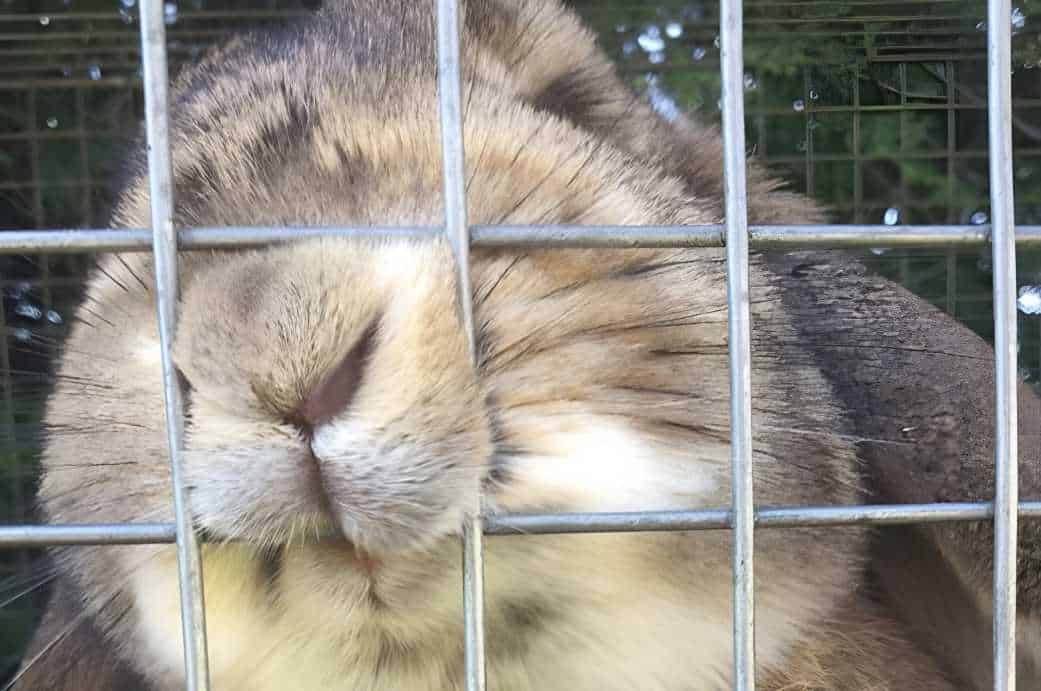
Though, rabbit chewing is already part of the life of the rabbit. They need to chew from time to time to avoid medical problems,, especially concerning their teeth. Thus, you only need to check if your rabbits have constantly been chewing things that they are not supposed to do.
When the bad chewing habit of your pet rabbit becomes unstoppable, it can get very frustrating. Do not worry because you are not alone in this battle, and other rabbit owners suffer from the same struggle.
We got you covered, though, because listed below are the things you need to do that can help you stop or prevent your precious rabbit from chewing:
Constant access to hay
It has already been mentioned that rabbit chewing is natural. They need to chew from time to time to prevent any medical concerns related to their teeth from occurring. Moreover, their teeth never stop growing, so chewing from time to time is necessary.
Make sure that your pet rabbit has constant access to hay. You can try different kinds of hay so they will not get rid of it quickly. You can also ask your Veterinarian on your next visit so they can recommend more options.
Bunny-proofing your house is necessary
Since we have established that one of the many reasons your rabbits start chewing even the furniture pieces and other materials at your home is that they do not have constant access to hay. Providing easy access for hays is necessary.
Another way to protect the furniture pieces and other hazardous items that can be a threat to your rabbits is to bunny-proof your home. Even before getting their pet rabbit, responsible pet owners should have considered this already. If you have a toddler in your household, you do not have to do this because bunny-proofing is the same as child-proofing.
The ideal diet should be provided
The ideal healthy diet of a rabbit must have at least 80 up to 90% of hay, while other foods such as fruits and vegetables, rabbit treats and snacks, and pellets have to be given tolerably.
Consider checking dental concerns
When your rabbit cannot catch up with the endless and rapid growth of their teeth, this can be a reason why they are chewing non-stop. They probably have dental concerns that are causing them pain. Make sure to get the teeth of your rabbits checked by the experts to be treated.
Might need to be spayed or neutered
It has already been discussed that hormones or hormonal imbalance can cause excessive chewing. Therefore, keep in mind that rabbits should be neutered or spayed once they reach the age of 6 months. There are good reasons for having to be spayed, such as preventing ovarian cancer for females and changing both genders’ temperaments and personalities.
Learn more about spaying and neutering a rabbit by watching this video.
Summary
We now understand that rabbit chewing is a habit, but excessive chewing can be alarming. Thus, you must be observant of your pet rabbit to notice if there are slight changes to their behavior. And in case they keep on chewing unnecessarily, you already know how to handle the situation.